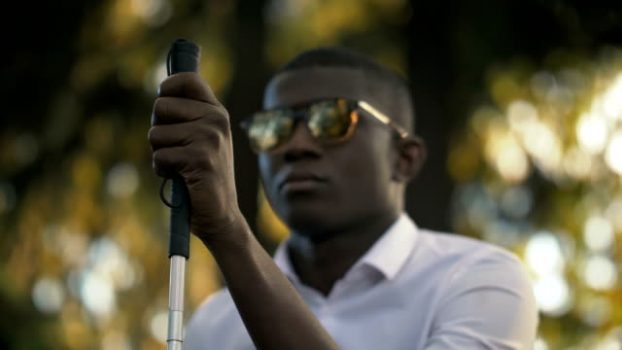Challenges of the blind in Ghana

Imagine not being able to step out of your home due to fear you might be knocked down by a car, or that you were bold to step out but fell into a gutter because you are blind or have any level of visual impairment. This fear is in fact the reality of many in Ghana.
The over five thousand(5000) blind persons registered with the Ghana Blinds Union in the Ashanti region live this horrible nightmare daily. It is their reality.
They have been talking and asking to be considered in decision making everywhere in order to make their burden a bit bearable, but no one seems to listen.
Mr. Ivan Heathcote-Fumador, a visually impaired young man explained some of their woes to Bernard Buachi of www.ghanagong.com and www.rawgist.com.
He revealed that many visually impaired persons in Ghana are highly productive and can contribute significantly to the fortunes of the country but remain indoors because they will not be safe outside. He laments that drivers in Ghana have no regard for the blind; a situation that makes life outside their homes dreadful. As if that was not enough, their experience is that the general population do not go out of their way to assist people with visual impairments or other physical disabilities.
Under these circumstances, what would make life easier for them is the white cane. The white cane is a long white cane with red reflectors, a handle and an insulated tip. It is internationally recognized as a guide for the blind and people with very poor vision. This stick guards visually impaired persons against accidents as it helps them identify obstacles, solicit passage from drivers when crossing roads, detecting heights, manoeuvring gutters, curves and other objects that might cause harm to them.
The sad thing however is that, out of the over 5000 blind persons registered with the Ghana Blinds Union in the Ashanti Region, over 4,700 do not have a white cane.
They are left with the option of either using sticks that do not guarantee their safety or simply remain indoors to avoid injury. The latter option will mean exclusion from social and economic life and its opportunities.
In order to help people with sight problems therefore, a lot of white canes will have to be made available to them.
Other issues:
Open drains have also become another danger to the blind and partially sighted. Consider a blind person alighting from a “trotro” which stops close to a gutter as the practice is in Ghana because there are no pavements on the shoulder of so many roads. He lands and his next step is in a gutter. This has been the experience of many blind and partially sighted persons.
Besides this, moving along a road with a cane when there is the eminent danger of an open drain is a big risk.
“Pavements and pedestrian walkways have all been taken over by traders. The visually impaired persons who dare to try to manoeuvre their way around these traders don’t get lucky always. The verbal abuse and the embarrassment of bumping into displayed wares is inevitable” Mr. Heathcote-Fumador recounts.
Access to Education
Another issue that affects blind persons adversely is the difficulty accessing education. The only way a blind child goes to school in Ghana is to travel to Wa in the Upper West Region or Akropong School for the Blind in the Eastern Region. Meanwhile, all other children can just attend school in their localities.
Technology is making education easy for persons with visual impairment. Unfortunately most of such children come from very poor homes where they are not prioritized on the family’s meagre income.
What do you think about this piece? Share your comment in the comment thread and share the story using the social media buttons above. You may reach the editor on 0249579664. Thank you.